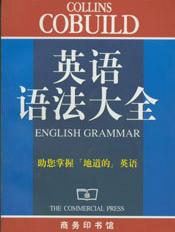牛津实用英语语法-第60章
按键盘上方向键 ← 或 → 可快速上下翻页,按键盘上的 Enter 键可回到本书目录页,按键盘上方向键 ↑ 可回到本页顶部!
————未阅读完?加入书签已便下次继续阅读!
—I should/would think so./I should think it would.I shouldn’t think it would./I shouldn’t/wouldn’t think so./I should/would think not.
—这个会很贵吗?
—我想是的。/我想不。
回答这一类问题时,回答人暗示他并不确实知道,只是凭印象而言。 I should/would think 表示的语气没有I think那么肯定。
should/would think引导一个附加评论时,一般不能用so/ not。这时必须使用that从句:
—He’s an astrologer, looking for work.
—I shouldn’t/wouldn’t think that he’d find it easy to get work.
—他是一个星相家,正在找工作。
—我想他大概不会感到找到一份工作是容易的。
B 如果评论发生在过去的动作,可以用should/would have thought:
—He actually got a job as an astrologer.
—I shouldn’t/wouldn’t have thought that it was possibe to do that.
—他真的以星相家的身份找了一份工作。
—我本来认为那是不可能的。
C should/would have expected+不定式结构/that从句也是可行的。有时非人称代词you可代替I:
—She has emigrated.
—Has she? You’d/I’d have expected her to stay in this country.
—她移居国外了。
—是吗?人们/我还以为她会留在国内的。
?
'Amber demo'
232 would 表示过去的意图
?
如已经提到的那样,如果will用来表示一般将来时,would 就是will的过去式:
He knows he will be late.
他知道他会迟到的。
He knew he would be late.
他当时知道他会迟到。
would也同样可视为表示意图的will的过去式(参见第201节):
I said,‘ I will help him.’
我说:“我要帮助他。”相当于:
I said that I would help him.
我说过我要帮助他。
He said,‘I won’t lend you a penny.’
他说:“我一便士都不愿借给你。”相当于:
He said that he wouldn’t lend me a penny.
他说过他一便士都不愿借给我。
但要注意,表示将来或意图的would,像在上述例句中那样,只限用于从句中,而wouldn’t表示否定的意图时则可以单独使用:
He won’t help me today.
他今天不愿帮助我。(他拒绝帮助。)
He wouldn’t help me yesterday.
他昨天不愿帮助我。(他拒绝帮助。)
与此相反 would不能这样用。因此如要把 I will help him to- day变为过去时,就必须用另一个动词来代替will:
I wanted/intended/offered to help him yesterday.
我昨天要/想/主动提出帮助他。
?
'Amber demo'
233 shall I/we?用于请求给予指示或表示
意见、主动提供帮助、提出建议等
?
请求给予指示:
How shall I cook it?
我该怎么煮这东西?
Where shall we put this?
我们该把这东西放在哪里?
如果这种请求只是请别人对某事提出意见,shall或should均可用:
Which one shall I buy?/ Which one should I buy?
我应该买哪一个?
主动提供帮助:
Shall I wait for you?
我要不要等你?
Shall I help you to pack?
要不要我来帮你打点行李?
主动提供建议:
Shall we meet at the theatre?
我们是否在剧院见面?
Let’s meet at the theatre, shall we?
我们在剧院见面,好吗?
(参见第318节关于 shall I/we?在间接引语中的用法部分。)
?
'Amber demo'
234 shall用于第二、第三人称
?
shall A 表示说话者想要完成某一动作或要别人来完成该动作的意图;B表示命令。这两种用法显得老式,语气比较正式,在现代英语口语中一般已不使用。
A shall 用于表示说话者意图的例子:
You shall have a sweet.
你会得到/得到一块糖。相当于:
I’ll give you a sweet./I’ll see that you get a sweet.
我要给你一块糖。/我负责让你得到一块糖。
He shan’t e here.
他不能来。相当于:
I won’t let him e here.
我不让他来。
They shall not pass.
他们不能通过。相当于:
We won’t let them pass.
我们不会让他们通过的。
在过去时中,即在间接引语中,通常改变用词:
He said,‘You shall have a sweet.’
他说:“你会得到一块糖的。”相当于:
He promised me a sweet.
他答应给我一块糖。
B shall 用于表示命令的例子:
Yachts shall go round the course, passing the marks in the correct order.
帆船必须跑完全程,按正确的顺序驶过各个标志。(帆船比赛规则)
Members shall enter the names of their guests in the book provided.
会员必须把所邀客人的名字登记在提供的本子上。(俱乐部规则)
这类句型结构主要用在规章制度和法律文件中。在不那么正
式的英语中,上述句子中的 shall就可用 must或 are to代替。
(参见第282节。)
C shall you?这种句型比较老式,但有时仍见于某些小说中,可能
因为这种结构比将来进行时简练:
Shall you go?
你去吗?相当于:
Will you be going?
你会去吗?
?
'Amber demo'
235 某些动词之后的that…should结构
?
在某些动词之后, that+主语+should结构可以代替动名词或不定式结构。
that…should结构在被动语态中是非常有用的形式,有时是被动式的唯一可能的形式。
that…should结构要比动名词和不定式结构更正式一些,常表示忠告者/组织者等人与应当有所行动的人之间的接触不太直接。
下列动词可与that…should结构连用: advise, agree, ar- range, ask, beg, mand, decide, demand, determine,insist,order,propose,remend,request,stipulate,sug… gest, urge。注意还有 be anxious, be determined。
She advised that we should keep the gate locked.
她忠告我们要把门锁好。
She advised that the gate should be kept locked.
她忠告我们应当锁好门。
She advised keeping the gate locked/advised us to keep it locked.
(译文同上。)
(参见第267节。)
上述例句中的advise可用 remend来代替,这样语气也较正式一些。
They agreed/decided that the roof should be repaired.
他们同意/决定屋顶必须修补。
They agreed/decided to repair the roof.
他们同意/决定修补屋顶。
He arranged that I should go abroad.
他安排我去国外。
He arranged for me to go abroad.
他安排我去国外。
They arranged that the minister should be met at the airport.
他们安排在机场迎接这位部长。
They arranged for the minister to be met at the airport.
他们安排在机场迎接这位部长。
be anxious(=wish;参见第27节C)后面与 arrange所跟的结构相同:
He is anxious that classes should start/should be started at once.
他急于马上开始课程。
He is anxious for classes to start/to be started at once.
(译文同上。)
They asked/begged/urged that relief work should be given priority.
他们要求/请求/敦促将救济工作放在优先位置。
They asked/begged/urged the authorities to give relief work priority. 他们要求/请求/催促当局将救济工作放在优先位置。
(参见第243节。)
He manded that the army should advance.
他命令部队前进。(他不一定与部队在一起。)
He manded the army to advance.
他命令部队前进。(他很可能跟部队在一起。)
She determined/was determined that he should study music.
她下决心要他学习音乐。
She determined/was determined to let him/make him study music.
她下决心要让他学习音乐。
She insisted that he should study music/insisted on his studying music.
她坚持他必须学习音乐。(参见第262节。)
He ordered that Ann should go.
他命令安必须走。(他大概是要某人转告安。)
He ordered Ann to go.
他命令安走开。(他大概是直接告诉她的。)(参见第320节。)
He ordered that the goods should be sent by air.
他命令货物得空运。
He ordered the goods to be sent by air.
他命令把货物空运。
He proposed/suggested that we should try homeopathic remedies.
他推荐/建议我们应该试一试顺势疗法。(参见第289节。)
He proposed/suggested that homeopathic remedies should be tried.
他推荐/建议说顺势疗法应该试一试的。
He proposed/suggested(our) trying homeopathic remedies.
他推荐/建议(我们)试一试顺势疗法。
They stipulated that the best materials should be used.
他们指定要求用最好的材料。
They stipulated for the best materials to be used.
他们指定,要将最好的材料用上。
有时be前面的should可省略。(参见第291节C。)
?
'Amber demo'
236 it is/was+形容词+ that… should结构
?
A that…should结构可以用于 it is/was advisable, b






